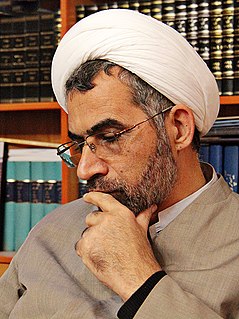Iranian rock refers to rock music produced by Iranian artists. Rock music has been popular in Iran since the late forties, with the emergence of singers such as Kourosh Yaghmaei, Farhad Mehrad, Fereydoon Foroughi and Habib Mohebian, but was largely forgotten after the Iranian Revolution. Like most rock styles, electric guitar and bass guitar and drums are the main instruments in this type of music. In some groups, the keyboard also has the task of adjusting the rhythms and symbols.

Ali Haghshenas is an Iranian writer, historian and journalist.

Majid Habibi is an Iranian voice actor.
Anecdotes of pious men is a book by Morteza Motahhari. It is an ethical fiction published in English by Ansariyan in 1993.
The Holy Defense Year Book Award is an international literary award presented yearly since 1993.

Maryam Salimi is a writer, journalist, communications scholar and expert in visual communications particularly in infographics and news graphics.
Marjan Sheikholeslami Aleagha is a former journalist, political activist, businesswoman and fugitive embezzler. She is married to Mehdi Khalaji, the Libitzky Family Fellow at The Washington Institute for Near East Policy and an advocate of economic sanctions against Iran. Marjan Aleagha is known for embezzling $7.4 billion in one of her cases.
Albert Koochooei is an Iranian writer, journalist, translator and radio broadcaster.
Negin Zomorodi is an Iranian composer and pianist.
Hamid Reza Shekarsari is an Iranian poet, researcher, author and literary critic. He has published more than 20 volumes of poetry and literary research.
Mahsa Shahbazian is an Iranian musician, composer and Qanun player.

Rasul Jafarian is an Iranian clergyman and researcher in field of Iranian history. He is currently the Professor of the Department of History at the University of Tehran, the Director of The specialized library on Islam and Iran, and the Director of the Central Library of the University of Tehran. Rasul Jafarian became a permanent member of the Academy of Sciences of Iran in June 2018 with the vote of the members of the General Assembly of the Academy of Sciences.

Bibliography of Rasul Jafarian is a list of books published by Rasul Jafarian, cleric, translator, writer and researcher of Iranian history.
The intellectual and political life of Shia Imams is the name of a book by Rasul Jafarian that has been written with the aim of investigating the political and intellectual aspects of the life of the Shiite twelve Imams. The content of this book was first published as a series of articles in Noor-e Elm magazine and then became an independent book. The book has also been translated into Arabic and Urdu. In 2011, the book was published again with many corrections. Excerpt and summary of this book in 400 pages has been selected by the Research deputy of Islamic Maaref University as a textbook in universities of Iran for history of Imamate course.
The Reflection on the Ashura movement is a Persian book and a research work about the Islamic event Ashura, by the Iranian author, Rasul Jafarian. In this book, after introducing the oldest and most important historical texts related to the history of Ashura, author has examined how the origin, consequences, falsifications and rituals of the Ashura movement were formed.

Poopak Niktalab is an Iranian education theorist, author and literary researcher, specially of children's literature.

Insha-Allah Rahmati is an Iranian philosopher, thinker, translator and a full professor of philosophy at Islamic Azad University in Tehran. His main interests are Ethics, Islamic philosophy and Traditionalist School (perennialism).

Sharif Lotfi is an Iranian musician, composer, conductor and Music pedagogue. He is the founder of the Faculty of Music of Tehran University of Arts and one of the professors of this university.

Arsad Tahmasbi is an Iranian musician, composer, radif-preserver, researcher, teacher, and Tar and Setar instrumentalist.
Foucault in Iran: Islamic Revolution After the Enlightenment is a book by Iranian-born American historian, sociologist, and professor Behrooz Ghamari-Tabrizi as a groundbreaking reassessment of Michel Foucault's writings specially on the Iranian revolution.








